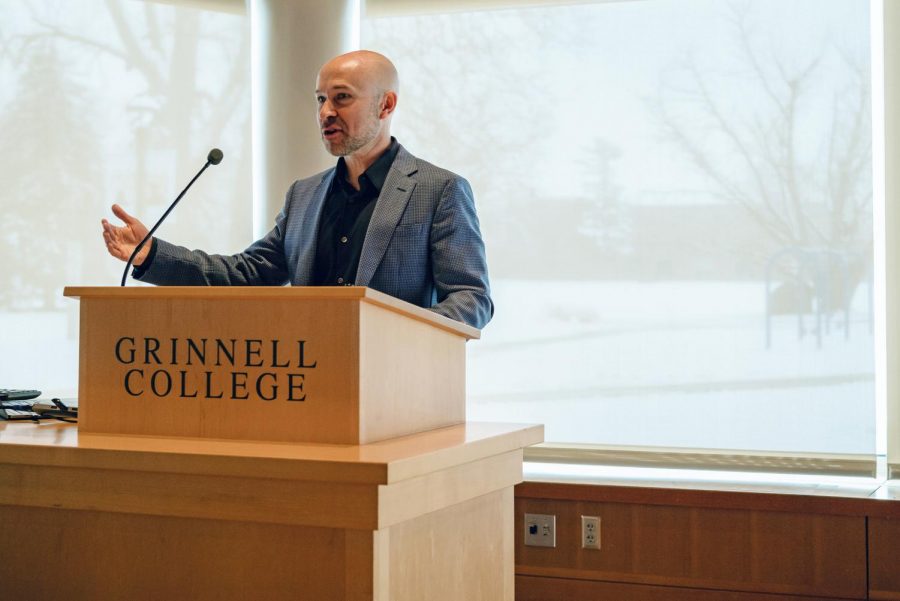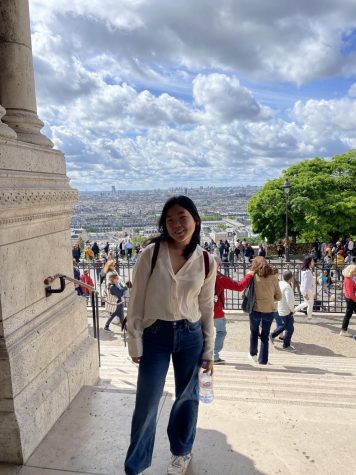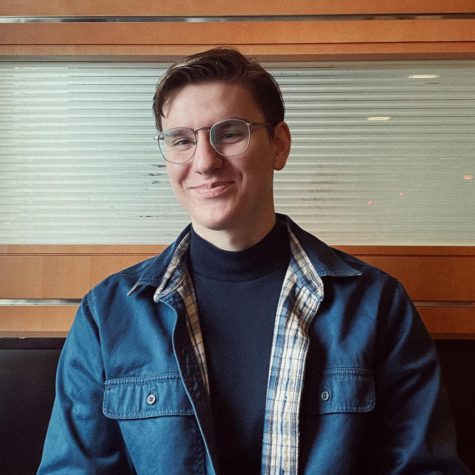Visiting speakers spread awareness about climate change through Rosenfield Program
Cullen Hendrix, senior fellow at the Peterson Institute for International Economics, gave a talk about climate change and security issues.
March 12, 2023
Grinnell College has been featuring events centering the international and domestic effects of climate change. On March 2, the Pakistani Student Organization (PSO) and the Rosenfield Program worked together to produce an informational event called Flooding in the Global South. The featured speakers included Shuchi Kapila, professor of English, Timothy Dobe, professor of religious studies, and Rumi Shammin, professor of environmental studies, from Oberlin College. On March 9, the Rosenfield Program hosted a Scholars’ Convocation on security issues that arise from climate change featuring Cullen Hendrix, senior fellow at the Peterson Institute for International Economics.
Ekta Shaikh `24 initiated the climate change panel as treasurer of PSO. “After the floods in Pakistan last year, we started the Pakistani Student Organization. We decided that we wanted to do something regarding climate change that would involve a panel discussion. We wanted more awareness, and we thought that a panel discussion would be helpful,” Shaikh said.
Shaikh said she was really inspired by the turnout at the event. “It was great centering voices that aren’t normally at the center of a conversation. It was about having the ability to create a
space that felt comfortable for me and people like me, both in a South Asian and an international student context,” Shaikh said.
Barbara Trish, professor of political science and the director of the Rosenfield Program, stated, “It’s really important to talk about the different consequences of climate change and seeing it from multiple different lenses. It’s something that we might not have been thinking about as much as 20 years ago when we thought about climate change. I’m really excited to bring in people who are on the cutting edge of thought on climate change.”
Kapila visited Oberlin and heard a talk given by Shammin about his work in Bangladesh. Kapila described Shammin’s work with activist groups on the ground responding to climate disasters as the reason behind requesting him to speak at Grinnell College. “I thought that would be of interest to students,” Kapila said. “There are many [activist groups] in South Asia because it’s a hotspot, and I felt like this is a good topic of discussion.”
During the panel, Kapila spoke about climate change in literature. One particular novel that Kapila mentioned is “The Great Derangement” by Amitav Ghosh. According to her, Ghosh makes the point that climate change is hard to represent in novels and we have not done as much work in literature as we should. She then launched off that point, asking “Why does he say that? Because most climate change plots appear in science fiction, because we think, ‘Oh, somewhere in the future, this could happen.’ What would you do if it started happening now and your novel of everyday life starts to have floods and tsunamis? That’s sort of the question Ghosh was asking.”
At the panel, Shammin spoke about his research in Bangladesh. He emphasized the importance of how taking action is more than donation. He claims that the money still helps, but influencing opinion and working with local actors is additionally crucial. He showed the importance of being an ally, learning about how you can help and how spreading that education helps others.
The following week, the Rosenfield Program held a Scholars’ Convocation regarding climate change featuring Dr. Cullen Hendrix from the Korbel School of International Studies at the University of Denver and senior fellow at the Peterson Institute for International Economics. Hendrix’s talk was titled, “An Age of Actorless Threats: Rethinking Climate Security,” and it dove into the security effects of climate change.
In his lecture, Hendrix emphasized the idea that “climate change is a silent killer.” He said that climate change is not the big bad wolf threatening to blow down your house but instead millions of termites eating away at the framework, which if left unattended, will destroy the house.
These two events were part of the Rosenfield Program’s focus on climate change. They are continuing their next part of the climate change symposium with Dorceta Taylor on Monday, March 13 at 4:15 p.m., and she will speak on “Untold Stories of the American Conservation: Privilege and Social Inequality.” The series will continue with an alumni panel on Tuesday, April 4.



















































